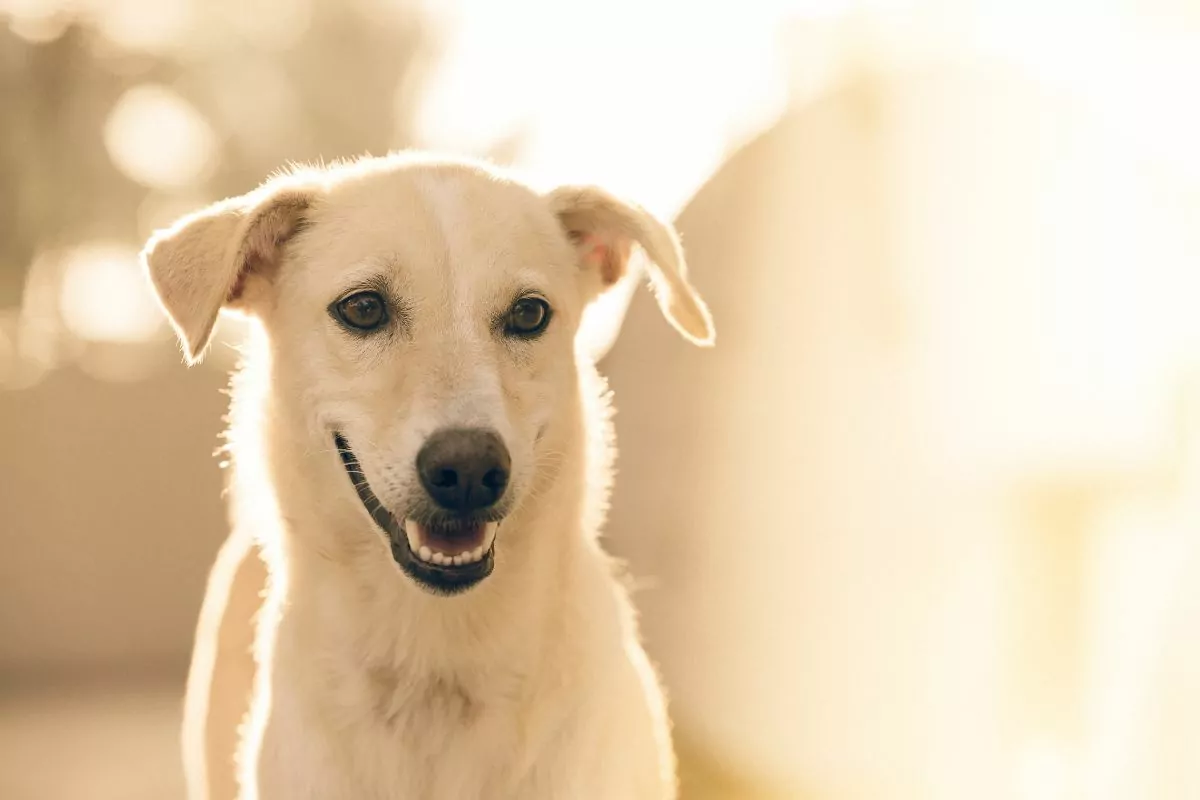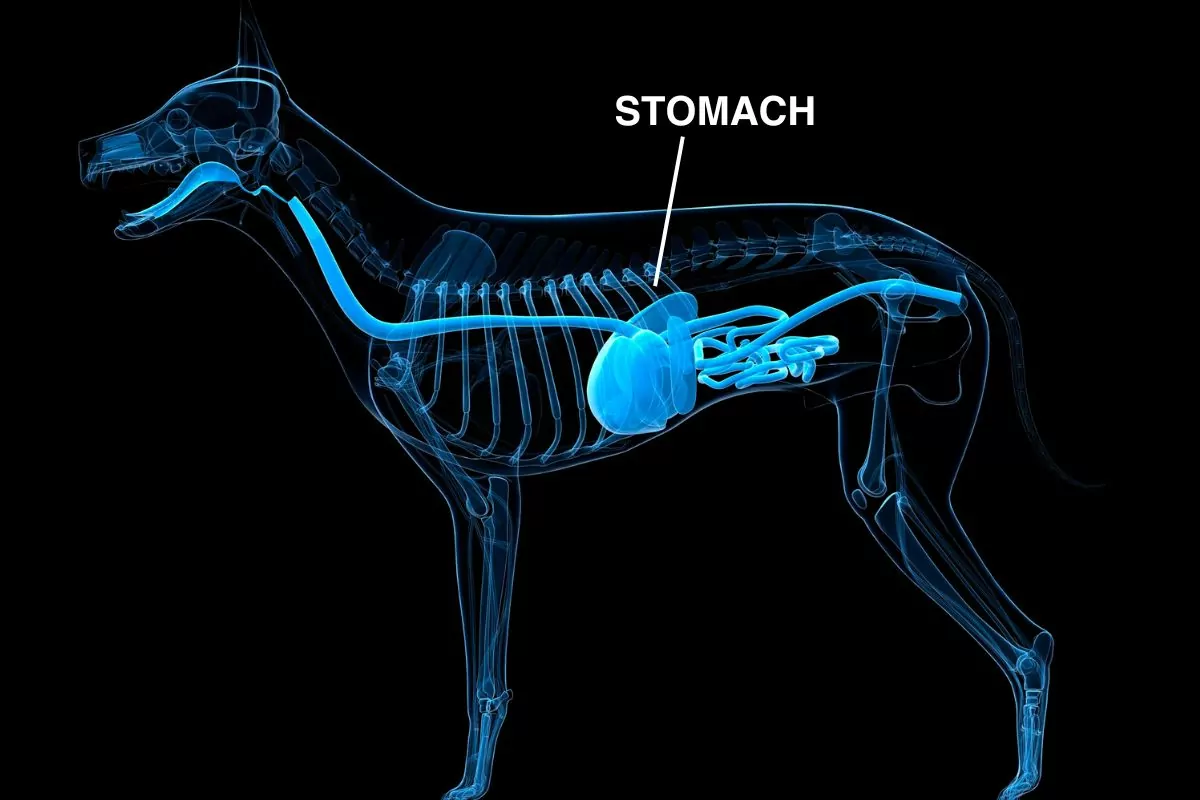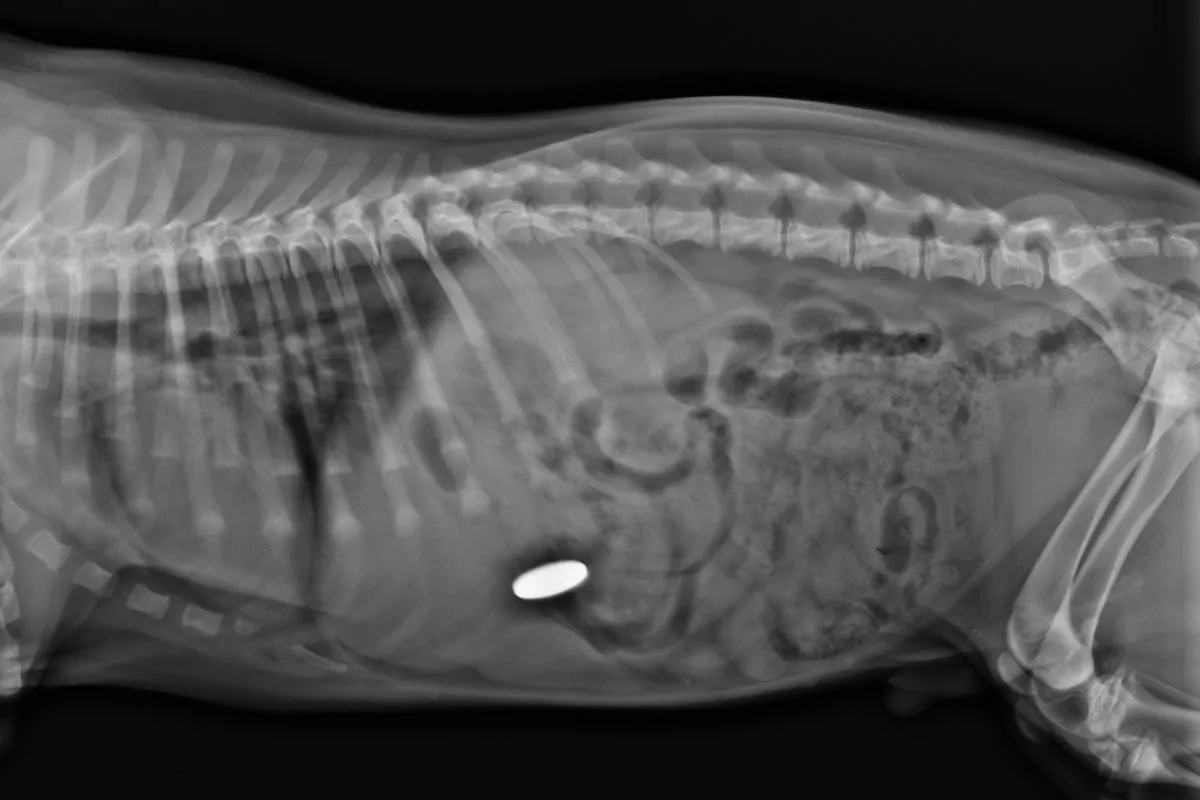Intestinal blockage in dogs is one of the dangers dog owners should be aware of due to their top-most curiosity.
Our canine companions have an innate knack for exploring the world around them, and their inquisitive nature sometimes leads them to ingest objects that don’t belong in their digestive system, which can sometimes lead to intestinal blockage.
In this article, we will delve into intestinal blockage in dogs, shedding light on the causes, symptoms, and available treatment options.
Whether you’re a knowledgeable dog owner or a first-time puppy parent, understanding the ins and outs of this condition is essential for safeguarding your furry friend’s health and well-being.

What is Intestinal Blockage in Dogs?
Intestinal blockage in dogs happens when there is a blockage in the intestines with foreign bodies, masses, or tumors that prevent the smooth passage of food and water through the intestine, either wholly or partially. It can be called bowel obstruction in dogs or gastrointestinal obstruction.
It is fatal up to a week after its occurrence because it can cause dehydration, intestinal torsion (twisting), intestinal intussusception (swallowing in of the intestine), constipation, reduction of blood flow to the intestines, absorption of toxins, and intestinal death.
Every dog is at risk due to curiosity, but puppies are most at risk. Because they are teething, they tend to put anything in their mouth, sometimes leading to trouble.
The Occurrence of Canine Intestinal Blockages
Intestinal blockage occurs when a dog swallows a foreign body and gets stuck in the stomach or intestines. Foreign bodies can include toys, string, yarns, dish towels, pieces of underwear and socks, intestinal masses, or tumors in older dogs. Dog intestinal blockage timeline is about three to seven days to become fatal.
Signs and Symptoms of Canine Intestinal Blockages
The signs of intestinal blockage in dogs are very similar to those of constipation. Symptoms of intestinal blockage in dogs are what the dog feels when in this situation. These factors include:
- Whining
- Aggressiveness when the abdomen is touched
- Bloated stomach
- Dehydration
- Appetite loss (anorexia)
- Lethargy (weakness)
- Difficulty or being unable to pass feces
- Diarrhea
- Vomiting
- Hunching of the back
Clearing Canine Intestinal Blockages
Are you wondering how to clear an intestinal blockage in dogs?
After your vet has assessed the situation and decided to let the object pass naturally, there are a few dog stomach blockage home remedies for dogs to quicken the process. These are:
- Ensuring lots of fresh water is available.
- Adding high-fiber components like canned pumpkin, wheat bran, and cooked sweet potatoes can help move obstructions naturally through the digestive tract and expel in the poop.
- Giving a bland diet to your dog that soothes the stomach.
- Adding probiotics to the diet. These bacteria benefit your dog and support the health of the digestive system. In times of stomach trouble, they can help.
Where is a Dog’s Stomach Located?
A dog’s stomach is a muscular sac located in the upper gastrointestinal tract between the esophagus and intestine and on the right side of the body.
Inside the stomach, numerous folds allow the stomach to expand during meals. The stomach contains cells that produce enzymes to aid digestion and an acidic environment to protect it from microorganisms.

How do Vets Diagnose an Intestinal Blockage in Dogs?
When you arrive at the vet clinic, the veterinarian will take a history and perform a physical examination. Sometimes, a blood test is needed to assess your dog’s overall health.
Your vet will do some diagnostic imaging to detect the kind of foreign object your dog swallowed. Such imaging tests include x-ray, ultra-sound, and endoscopy (a tube with a camera end and a grabbing part is inserted through your dog’s throat to retrieve the object).
Your dog would be sedated and wouldn’t feel a thing.

Dog Intestinal Blockage Treatment
Dog intestinal blockage treatment can be surgical or non-surgical. The factors considered before deciding which approach to use include the object’s size, shape, and structure, how long the obstruction has been present, and the location of the foreign body.
Some foreign bodies can pass out independently with time; however, sitting at home with your dog waiting for it to pass is not advisable when you know it has swallowed something. Others can be removed with an endoscope if not embedded too deep.
Your vet would give fluids to your dog to combat the dehydration, pain medications for the pain, and an anti-emetic drug for the vomiting, if any.
If your dog needs surgery, the veterinary team will tell you what to do in the days leading up to the procedure. The vet and the surgical team will assess your dog again and place it under anesthesia before the surgery begins.
The veterinarian will make an incision in your dog’s abdominal area closer to the location of the obstruction, as seen on the imaging test. Your vet will carefully remove the foreign body and repair any stomach and/or intestinal wall damage.
The success of intestinal blockage surgery in dogs depends on their health, how long the obstruction occurred, and the type of object swallowed. Your dog would stay for a few days in the hospital for monitoring (known as the critical period). This entails a typical stay of at least 72 hours.
After this period, your dog will likely fully recover most of the time. Recovery length depends on how extensive the surgery was, any complications, and your dog’s overall health.
The vet would advise you to feed your dog bland food for a specified amount of time before you switch to regular diets with plenty of water and exercise them minimally by going on short walks.
Also, ensure that your dog does not chew the sutures at the incision site by ensuring they are always in the cone. Follow your vet’s recommendation on pain medication to give your pets so they don’t feel pain after the surgery.
Complications that might arise from the surgery can include:
- A low protein count (hypoalbuminemia).
- Wound openings.
- Bacterial toxins in the blood (sepsis).
FAQs From Dog Owners
If My Dog Ate Something Bad, How Long Before Symptoms Start to Manifest?
The duration before symptoms start depends on how big or small your pet is, the size of the object swallowed, your pet’s overall health, what your pet ate, and how much it ate.
Symptoms can range from a few hours to several days.
How Can I Try to Help My Dog Pass an Obstruction Before Going to the Vet?
It is best not to attempt anything; you might think you are trying to help your pet, but you might cause more harm than good. Some obstructions can tear the intestinal wall when we pass them out ourselves. Taking them to the vet when you suspect something would be best.
Can a Dog Still Poop With a Blockage?
Depending on the type of blockage, the answer is yes or no. Your dog won’t be able to poop in the case of a complete blockage. But for a partial blockage, your dog might poop a little and with incredible difficulty. However, there is no set information for this; it can also depend on what your dog ingested.
How Can Intestinal Blockages in Dogs be Prevented?
To prevent future intestinal blockage, ensure, like children, objects are out of your dog’s reach; prevent your dog from feeding from the trash can; keep an eye on them when they are playing; and pay attention when an object is missing around your home.
Teach your dog the “Leave it” command and practice it during training sessions.
Final Verdict
If you have seen your dog eat something, the best help to give is to get them to see a vet as soon as possible. Most signs and symptoms resemble an upset stomach, so don’t be quick to ignore any warning signs, especially if you are unsure.
Even though there is a natural way to help a dog pass obstructions, and if your dog ate something bad, how long before symptoms start?
Intestinal obstructions are life-threatening, and you should treat it as an emergency. Prevent your dog from exposure to potential items that can cause blockages to ensure it’s always protected and safe from harm.
